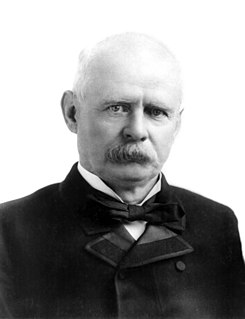A Quote by George McGovern
Politics is an act of faith; you have to show some kind of confidence in the intellectual and moral capacity of the public.
Related Quotes
If I did not believe, if I did not make what is called an act of faith (and each act of faith increases our faith, and our capacity for faith), if I did not have faith that the works of mercy do lighten the sum total of suffering in the world, so that those who are suffering on both sides of this ghastly struggle somehow mysteriously find their pain lifted and some balm of consolation poured on their wounds, if I did not believe these things, the problem of evil would indeed be overwhelming.
Men have gone on to build up vast intellectual schemes, philosophies, and theologies, to prove that ideals are not real as ideals but as antecedently existing actualities. They have failed to see that in converting moral realities into matters of intellectual assent they have evinced lack of moral faith.
Faith is indeed intellectual; it involves an apprehension of certain things as facts; and vain is the modern effort to divorce faith from knowledge. But although faith is intellectual, it is not only intellectual. You cannot have faith without having knowledge; but you will not have faith if you have only knowledge.
Faith, then, generically, is confidence in a personal being. Specifically, religious faith is confidence in God, in every respect and office in which He reveals Himself. As that love of which God is the object is religious love, so that confidence in Him as a Father, a Moral Governor, a Redeemer, a Sanctifier, in all the modes of His manifestation, by which we believe whatever He says because He says it, and commit ourselves and all our interests cheerfully and entirely into His hands, is religious faith.
It is not his business to argue men into faith, for that cannot be done; but it is his business to demonstrate the intellectual adequacy of the biblical faith and the comparative inadequacy of its rivals, and to show the invalidity of the criticisms that are brought against it. This he seeks to do, not from any motive of intellectual self-justification, but for the glory of God and His gospel.
It is this capacity for relentless self-criticism that should be - everywhere - the true measure of intellectual freedom and cosmopolitanism, not the entrenched cultural power and self-congratulatory moral rhetoric of some people in countries long accustomed to telling other societies what to do and how to behave.
People often say that Trump "speaks the truth," right? But I think what really is happening is he's become a symbol of the kind of cynicism the American public feels towards politicians. He embodies, and he's mobilizing, that cynicism. Because people have no faith in politics anymore. People actually believe that politics is dead, because it's bought and sold.
Fear, coercion, punishment, are the masculine remedies for moral weakness, but statistics show their failure for centuries. Why not change the system and try the education of the moral and intellectual faculties, cheerful surroundings, inspiring influences? Everything in our present system tends to lower the physical vitality, the self-respect, the moral tone, and to harden instead of reforming the criminal.
The objections to religion are of two sorts - intellectual and moral. The intellectual objection is that there is no reason to suppose any religion true; the moral objection is that religious precepts date from a time when men were more cruel than they are and therefore tend to perpetuate inhumanities which the moral conscience of the age would otherwise outgrow.


































